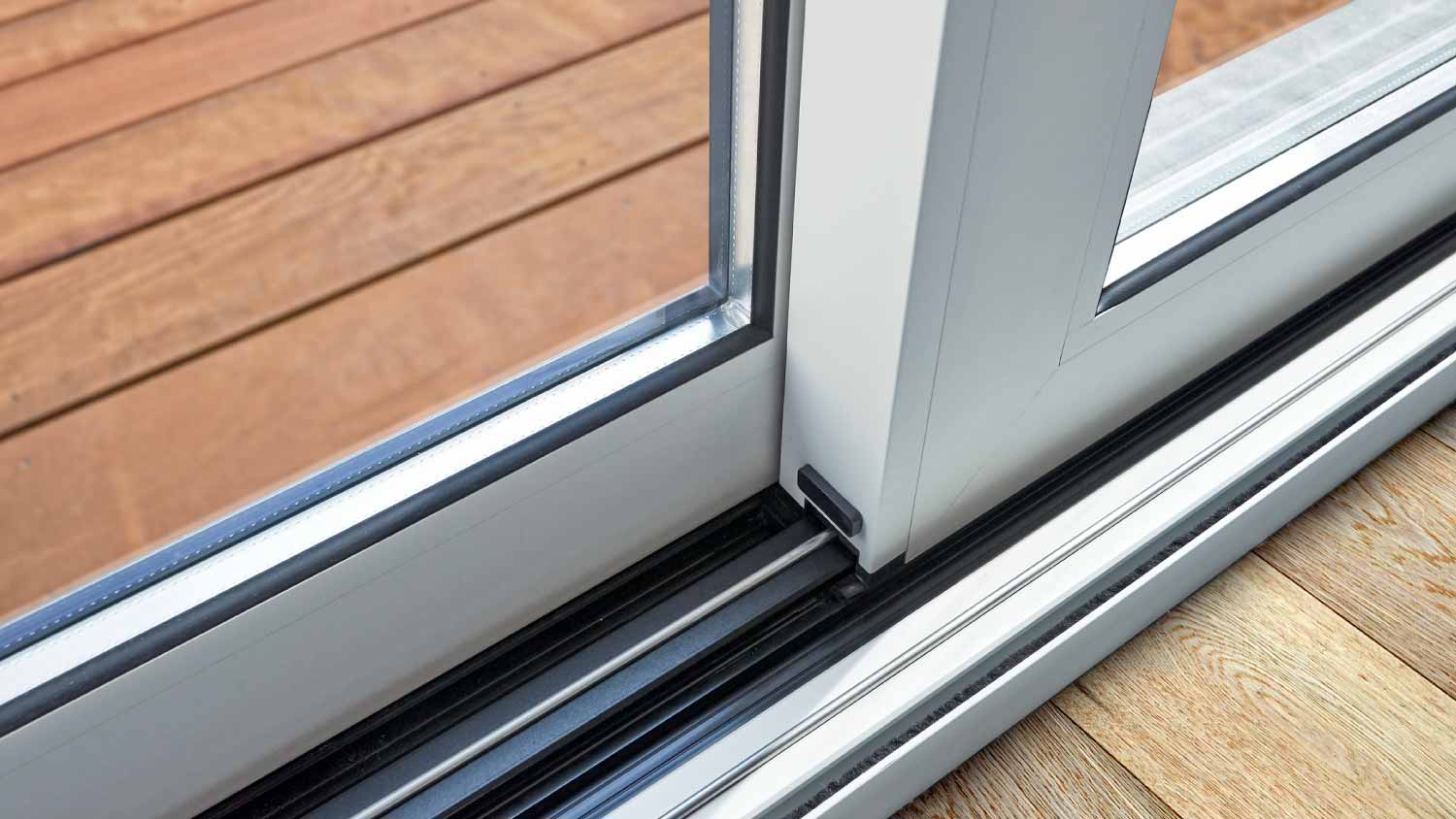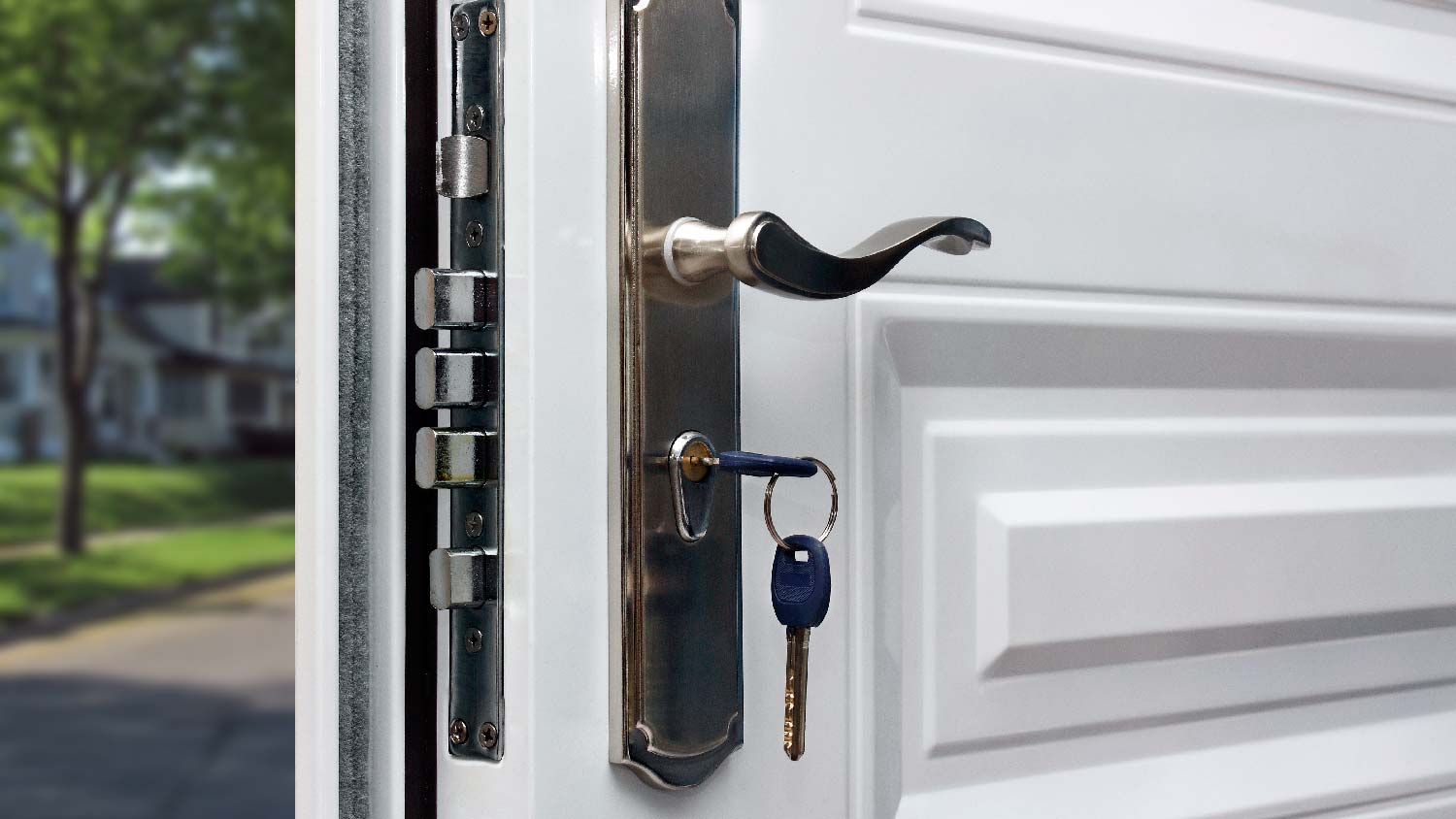
Discover the cost to weatherstrip a door, including average prices, key cost factors that impact your total price, and tips to save on your project.
Check out our tips for better insulating your sliding door—and keeping the cold outside


Sliding doors are one of the best ways to enjoy a fresh spring breeze, a summer backyard barbecue, and cool autumn air. But in the winter, sliding doors can be a nightmare for your comfort (and your utility bills) if they’re poorly insulated; heat can escape so easily. Below, we’ve assembled eight of the best ways to insulate sliding glass doors ahead of the long winter months.

The easiest—and most affordable—method for insulating sliding glass doors for winter is simply to clean the track. Stay on top of this routine cleaning task throughout the year. Every time you get out the vacuum to sweep the rug or the carpet, take the hose attachment over to the sliding door track and suck up all the dust, dirt, pet hair, and dead bugs that find their way into it.
How does this help? Keeping the track clear lets the door seal optimally. When it’s not perfectly sealed, you’ll get a lot of drafts, meaning the warm air will slip out, and you’re left with a chilly room.
If your sliding door has only blinds or a thin curtain, head to a home goods store or shop online to purchase a thick, thermal curtain. Heavy, insulated curtains do a great job of keeping the cold out—but just keep in mind they will also keep the sun out.
Winterizing sliding doors involves factoring in the amount of sunlight that enters the room. Open the curtains if the sliding door receives bright, direct sunlight during the day; the sun can do wonders for heating up a room. But on cloudy days or whenever the sun isn’t beaming in, close the curtains to trap in the heat. And don’t forget that you can also do the opposite for those hot, summer months. Keep the curtains closed to prevent heat from entering your home.
The best part? You won’t break the bank on weatherproofing sliding glass door insulation if you DIY. Thermal curtains cost as little as $20.

You can find plastic window film insulation kits at most hardware stores and big-box retailers for under $10. While it might not look pretty when installed, plastic film acts almost like a storm window for your sliding door—an extra layer of plastic insulation keeping the warm air inside.
Besides, you can simply close your new thermal curtains over the plastic when you have company over if you don’t want them to see the film.
Plastic film certainly isn’t the best type of insulation for your home, but it’s ideal for large sliding doors and drafty windows.
Caulking is one of the most affordable home improvement steps you can take to dramatically decrease your utility bills—and not just around your sliding door. According to the Department of Energy, sealing air leaks around the whole house with caulk costs between $3 and $30, takes 1 to 2 hours, and can increase your energy savings by up to 20%.
How does caulk insulate your sliding door? Use it to seal any gaps and cracks around the door frame. These gaps and cracks may seem tiny, but they can be a huge source of energy loss.
New to sealing air gaps? Here’s how to caulk like a pro.

When your sliding door was installed, it had weather stripping that sat between the door and the frame. This weather stripping is important for creating a seal to keep warm air from leaking in the winter.
Over the years, however, regular use of the door will wear down the weather stripping, especially if it was of low quality to begin with. Assess your current weather stripping, and replace it if necessary. Look for a higher-quality weather stripping that will last longer and provide better insulation.
Never tried this task before? We’ll walk you through how to replace weather stripping on a door in five easy steps. You can also hire an insulation company near you to tackle this and other insulation tasks that will make your sliding door more efficient.
A draft stopper, draft blocker, or draft snake is a step up from your standard weather strip for doors. Draft stoppers come in many shapes, sizes, and materials, but they all operate by blocking air from entering or leaving your home through the bottom of the door. You can increase the effectiveness of weather stripping by using a draft stopper and weather strip like a door sweep for maximum energy efficiency.
Install a draft stopper according to the manufacturer’s instructions. This usually involves using a connecting application—adhesive-based or fabric-based—to secure the stopper to the door so that it stays in place.
Foam insulation doesn’t just insulate your walls and attic. It just so happens to work great at sealing any air leaks around sliding glass doors. Spray foam can be used to carefully insulate the areas around your doorframe. Be sure to use spray foam for windows and doors to prevent the foam from bending the door frame. You can also install foam panels, like fiberglass or rigid foam panels.
The only downside to foam insulation is the way it looks. However, if you’re after the most savings on your energy bills, using foam panels during the winter and summer months may be worth the decreased natural lighting and lower aesthetics.
Replacing your old, drafty door’s insulation can make a noticeable difference in your energy bill, but if you want to really improve your home’s heat retention in the winter, you should consider a full-on insulation project. Insulation costs between $1,075 and $2,600, but that varies by type of insulation:
Spray foam insulation costs between $1,400 and $4,150.
Blown-in insulation costs between $975 and $2,300.
Looking for more ways to retain heat this winter? Here’s how to insulate the floor in your home—and how to cut insulation on your own if you’re feeling DIY savvy.
Ultimately, if your sliding doors are old, single-pane, and have clear signs of wear and tear, then no amount of insulation hacks will be as effective as simply upgrading the glass. Installing a new and improved sliding door with energy-efficient glass is a great way to increase the door’s insulation. Several types of glass for doors perform well when it comes to door insulation, including:
Double-pane glass: This type of glass contains two panes spaced apart and sealed for better insulation.
Triple-pane glass: For an extra layer of insulation, consider using triple-pane glass.
Low-e glass: Also called low-emissivity, this coating can reduce energy loss anywhere from 30% to 50%, according to Energy.gov.
Low-conductivity gases: Gases in the spaces between each window pane can also impact the insulation properties of your sliding glass doors. Krypton is better at minimizing heat transference but costs more on average than argon.
You can expect to spend between $1,200 and $4,300 on the cost of a new sliding door. Survey multiple local door installation companies for quotes to find the most competitive pricing near you. It’s also possible to replace a sliding door on your own.
From average costs to expert advice, get all the answers you need to get your job done.

Discover the cost to weatherstrip a door, including average prices, key cost factors that impact your total price, and tips to save on your project.

Are you looking to upgrade an old door in your home? Use this interior door installation cost guide to estimate the project's total cost and learn how to save.

Discover fire door cost data, including installation, materials, and tips to save. Learn what impacts fire door pricing and how to budget for your project.

Are you tired of your door sagging and defying your wishes to close properly? Say no more. Learn how to fix a sagging door with these methods.

Who to hire to replace a door frame isn’t as open and shut as you may think. Here’s a guide to hiring a professional to do the job right.

Discover the average security door installation cost, key price factors, and expert tips to help you budget for your home’s safety upgrade.